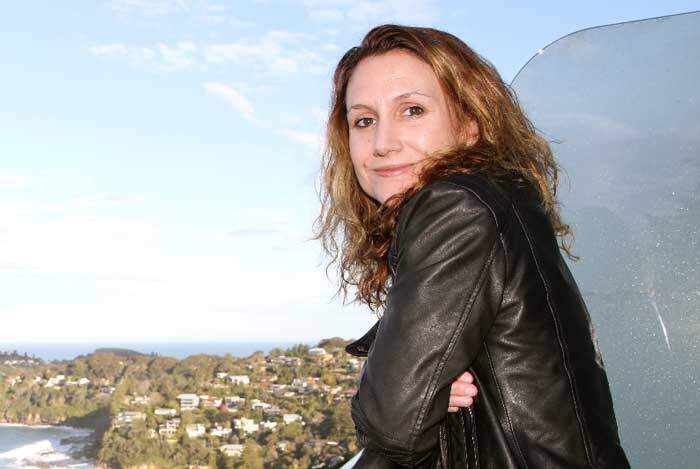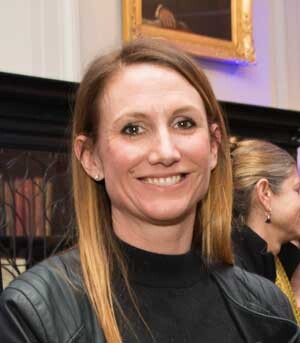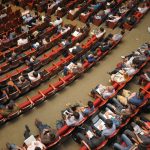According to Tanya Evans, professor at the University of Macquarie (Sidney, AU), “we need to explain how our knowledge is constructed and the methods we use in clear and concise ways to people not trained as historians through the academic pathways we have enjoyed”.
Andre de Lemos Freixo interviews Tanya Evans
You may have already seen here at Cafe Historia some text talking about Public History, like this commented bibliography. In short, Public History is an international movement that brings together people acting in different spaces and from different partnerships. People concerned with making historical knowledge accessible to wider audiences, which is key to counter denialism and to bridge the gaps between academia and society.
In our new interview, we talked to Tanya Evans, who has been discussing Public History from many other perspectives, such as the so-called “applied history” and “family history”. Evans is Associate Professor of Modern History, Policy, and International Relations at Macquarie University (Sidney, AU) and public historian specializing in family history, motherhood, poverty, and sexuality.

Andre de Lemos Freixo is our interviewer this time. Freixo is Lecturer at the History Department of the Federal University of Ouro Preto (UFOP). He currently lives in Manchester, where he is a visiting scholar at the University of Manchester (UK).
Why did you choose to work with Public History? How do you define Public History?
I trained as a social and cultural historian in Britain during the 1990s and 2000s, studying my first degree in history and politics at the University of Edinburgh. I undertook my MA and PhD at the University of London under the supervision first of Anna Davin for my Masters and then Sally Alexander for my PhD, you may know that they were key constituents of the British History Workshop Movement. Since then my research has focused on the history of the family, motherhood, gender, poverty and sexuality. I’ve always been passionate about researching ordinary people and places in the past and I’ve become much more interested in incorporating ordinary people and places in the process of my research and the construction of historical knowledge.
I began to think of myself as a public historian when I moved to Australia just over 10 years ago but while I was still based in London my identity as a public historian was taking shape, even if I wasn’t conscious of this at the time. History and Policy in Britain was set up in 2002 and based at the Centre for Contemporary British History at the Institute of Historical Research in London where I was working as a Research Fellow for Professor Pat Thane. I understand now how much I learned about the benefits of engaging with different audiences and seeking to make an impact on policy makers and ‘ordinary’ people with our historical research on lone mothers in 20th century England. This was when I first started to produce public history (although at the time I didn’t call it that) and to work in teams on a variety of outputs, including an exhibition at The Women’s Library and a BBC documentary entitled Shame about Single Mums.
I moved to Australia in 2008 to take up a research fellowship at Macquarie University in Sydney and I became involved with the History Council of NSW (the peak body for historical organizations and people interested in history across the state of New South Wales). This led to my involvement with the Australian Policy and History network set up in 2010 and modelled on the British version. The network is now benefiting from renewed funding, energy and the commitment of some keen advocates based in Victoria.
My first three books were about the history of ‘illegitimacy’, poverty and philanthropy. One of these books, Fractured Families (2015), is about Australia’s oldest surviving charity, the Benevolent Society established in 1813, and I wrote this in collaboration with family historians while working as a consultant for the charity. This was when I first began to identify as a public historian – which I define as working with and for diverse communities on the production and consumption of history. I try to write for general as well as academic readers, politicians and social policy makers and I make radio and television programs based on my scholarship. With each research project that I work on – I think about how I can vary my outputs and reach different audiences as a result. This attention to the needs of different audiences is key to the work of public historians. I pitch my work at a variety of audiences because my research is targeted at disrupting people’s everyday assumptions about the history of the family. It questions supposedly ‘authoritative’ or ‘commonsensical’ knowledge about family life in the past. I am committed to the democratization of historical knowledge and I think that public historians need to become better at explaining what we mean by this. We need to work harder at explaining the impact increased access to historical sources and knowledge has had through the Internet and digitization and our pro-active role as public historians in this process. We need to become better at staking our claim to the power and benefits of knowledge about the arts and humanities in our neoliberal age.
Tanya, your work at Macquarie University takes place inside the Center for Applied History. Could you talk a little bit more about the proposal, the activities and results of a multidisciplinary initiative such as this?
With colleagues from many disciplines I established the Centre for Applied History in late 2016 in the Faculty of Arts at Macquarie University. Our internal collaborators are drawn from the Department of Media, Music, Communication and Cultural Studies, Geography, Ancient History and the Australian History Museum as well as colleagues in the Faculty of Business and Economics and Human Sciences. All of us are interested in how history works in everyday life.
The Centre builds on national networks with the State Library of NSW, History Council of NSW, Professional Historians Association NSW & ACT, the Irish Famine Memorial Committee, Society of Australian Genealogists, Australian Dictionary of Biography, Australian Policy and History Network, and the Dictionary of Sydney. We also have strong international networks—including the Centers for Public History at the University of Hamburg, Carleton University, Canada, with the International Federation of Public History as well as the History and Policy network in the UK. We focus on family history, digital history and e-research, cultural heritage, museums, oral history, consultancy work for charities and non-governmental organizations, policy, television, radio, community, regional and local history.
We are currently focused on four projects involving family history. Firstly, I am examining the practice, meanings and impact of family history, migration and multiculturalism among migrant communities to Australia and Canada from the 1970s to the present, using oral histories, archival evidence and survey data. The project reveals how family history empowers millions of researchers, linking the past to the present in powerful ways, transforming individuals’ understandings of themselves and the world. It shows how family history makes an impact on understandings of identity and citizenship.
The second project is the Art and Object Engagement program led by Jane Thogerson at the Australian History Museum at Macquarie University. This program is a dementia therapy program and facilitates research into how people living with dementia engage with art and objects of social history.
The third project is undertaken by a large team of interdisciplinary scholars including archaeologists, historians and heritage consultants and involves partnerships with New South Wales Parks and Wildlife Services and the Blue Mountains World Heritage Institute. It is entitled ‘Recovering the Past for the Future: Exposing a Jamison Valley shale-mining community’s history and heritage, 1889-1914’. It aims to investigate the archaeological, archival, and oral evidence relating to shale mining in and around the Jamison Valley, near Katoomba, NSW, through collaborative, community-based research. We propose to use this evidence to reconstruct, to analyze, and to interpret everyday life – especially work, family, and material culture – in pre-World War I mining communities (ca. 1880-1914).
The fourth project is a ‘people’s history’ of motherhood in Australia which involves collaborative work with family historians working through their publications, photographs and objects (including self-published books held in personal collections as well as State and National libraries), memoirs, surveys, personal collections of family archives, focus groups, and interviews.
Since 2016 as part of my work for the Centre for Applied History I have organized several master classes and workshops with and for family historians, some in collaboration with the State Library of NSW’s Education and Scholarship section, the Royal Australian Historical Society and the Australian Lebanese Historical Society. All these events have highlighted the benefits of working in collaboration not just with family historians but also with cultural organizations and institutions who cater to large numbers of family historians as clients.
Tanya, Family History plays a major part in the works of the Center in which you work. Your latest books thematize this kind of history. How would you define Family History? Are there many obstacles to research projects like that?

Family history involves studying family life in the past through genealogical and social historical research. The practice is booming around the world. People can be very snooty about family history and my research tries to challenge some people’s dismissive attitudes towards family historians and the knowledge they are producing. I think that academic historians should be engaging with family historians because they are our history students beyond the classroom, they have developed significant historical skills and they are producing empirical knowledge that transforms their own and others’ understanding of the past as well as the present. It is for this reason, I argue, that contemporary public historians, inside and outside academe, should revisit the efforts of their social history forebears in the 1970s, especially the work of the History Workshop movement, to ‘enable popular participation in historical research’ in new ways for the 21st century to reap the benefits of the popularity of historical research among family historians around the world (See Sophie Scott-Brown, The Histories of Raphael Samuel: A Portrait of a People’s Historian (ANU E Press, 2017). I also want to explore how family historians might work with academic historians in the future to fulfil an emancipatory educative agenda with good political effects? I say this because too many of my colleagues think public history is just about the dissemination of academic research – about broadening audiences for their work and while this is important, we know that this is not what public history is about. I want my colleagues to understand public history as a sub-discipline in its own right and to recognize its potential to reshape the discipline of history as a whole.
Many scholars have concerns that the democratization of history challenges academic authority and leads to ‘ordinary people’ ignoring their extensive training and expertise. Instead of being concerned about the threat to our academic authority I think historians need to get better at communicating how our knowledge and expertise is constructed to people not trained in history as a discipline. We need to explain how our knowledge is constructed and the methods we use in clear and concise ways to people not trained as historians through the academic pathways we have enjoyed. ‘Ordinary’ people are profoundly convinced of the value of history and it’s important we play an active role in teaching how history is made, from our perspective, to these audiences so that we can learn from each other more effectively.
I will certainly always remain committed to troubling hierarchies of knowledge, expertise and academic authority. As many academic historians around the world worry about declining enrolment numbers in university history departments worldwide, I take enormous pleasure reading, hearing, watching and charting the passion that ‘ordinary people’ have for history. Public history projects can provide individuals with social, emotional and cultural capital, using history to think about their lives and the world differently, empowering them to live their lives in alternative ways, enabling individuals to become more active and engaged citizens across the globe. Public historians need to enable popular participation in historical research to work towards an emancipatory educative agenda with productive political effects.
You are accustomed to speaking to large audiences of non-experts. How do you feel speaking in front of those audiences?
It is a privilege speaking about history to audiences large and small. The more you collaborate with diverse communities in the process of history making, presenting and writing – the easier it is to communicate with them and to share your research journeys with others. I rarely lecture to undergraduate students since I ‘flipped’ all my teaching in 2014 so I really relish the opportunity to talk about my research with audiences keen to learn more about the past. If we take the trouble to write books we should be prepared to talk about them frequently and to encourage people to buy and read them. This should make us happy (as well as our publishers).
What ethical challenges would you say historians face when the past and history comes to the public?
Working in public history leads to lots of community engagement and collaborative work, which is almost always enjoyable and beneficial for everyone involved. However, collaboration comes with risks and many public historians benefit from our knowledge of ethics learned from oral historians over the past few decades. I have worked with family historians from some families who disagree with family historians in the same family – this can be complicated! That said – I have learned a lot through experience and sometimes I’ve learned how to do things differently with future projects the hard way (I will write about this one day!). It is important to always respect the contributions of others even if they don’t agree with you and you with them. I love explaining my practice of history to people who have not been trained like I have and who challenge my interpretations. I think a really important part of a public historian’s role is to explain why history matters to people who have not spent their lives studying the subject and/or working in the field.
Tanya Evans is Associate Professor in the Department of Modern History, Politics and International Relations. PhD University of London. MA Women’s History, University of London MA (Hons) University of Edinburgh Director of the and Director of the Centre for Applied History. Steering Committee Delegate in the International Federation of Public History
Andre de Lemos Freixo is our interviewer this time. Freixo is Lecturer at the History Department of the Federal University of Ouro Preto (UFOP). He currently lives in Manchester, where he is a visiting professor at the University of Manchester (UK).
How to cite this interview
EVANS, Tanya. Public History and its Multiple Engagings: Interview with Tanya Evans (Interview). Interview given to Andre de Lemos Freixo. In: Cafe Historia – History made with clicks. Available at: https://www.cafehistoria.com.br/public-history-engagings/. Posted on Nov 11 2019.

